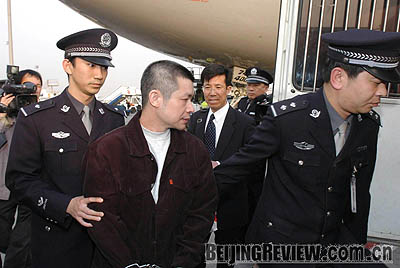|

BACK HOME: Chinese police officers arrest Yu Zhendong, a former bank manager charged with corruption, at Beijing Capital International Airport, after he was extradited from the United States in April 2004
France and Australia are no longer safe havens for some Chinese criminals thanks to new extradition treaties that China's top legislature ratified on April 24.
Dong Xiuli, a professor of international politics at Beijing International Studies University, hailed the approval of the extradition treaties and said they would enable China "to have direct contact with the countries involved and implement the rights and obligations stipulated in the treaties."
"Without extradition treaties, what we can do is send a report to Interpol and wait passively," she said, referring to the international police organization that lets intelligence agencies around the world collaborate in finding and arresting alleged criminals.
China signed the extradition treaties with France and Australia in March and September 2007, respectively. Both treaties have 23 articles, covering such issues as extradition obligations, extraditable offences, reasons that can and should be used to refuse extradition and the implementation and termination of the treaties. Spain and Portugal are the only other two developed countries, with which China also has extradition treaties.
"The ratification pronounces a groundbreaking breakthrough, because we have conquered the core problem, which paves the way for the ensuing treaties," Dong said.
Echoing Dong's viewpoint, Huang Feng, an expert in international criminal law, said that the move was of vital significance in pursuing corrupt officials hiding in those two countries.
Despite the treaties' reservations on China's death penalty, experts argue that they are symbolically important for the country's cooperation with foreign countries in the judicial field.
A breakthrough
Extradition is an official process by which one nation requests and obtains from another nation the surrender of a suspected or convicted criminal. But countries do not have any obligation to surrender alleged criminals to foreign states. Therefore, they must establish extradition treaties to deal with criminal matters between them.
China signed its first extradition treaty with Thailand in 1993. So far, most of the countries that have signed extradition treaties with China are its neighboring countries, such as Russia and Mongolia. Twenty-four of the treaties have come into force.
Dong said extradition is an important system in international law. The promulgation of China's Extradition Law in 2000 and the conclusion of the treaties provide a legislative guarantee for standardizing extradition operations between China and other countries. They also enhance China's international credibility, contributing to further judicial cooperation, she said.
"The judicial cooperation with foreign countries is conducive to maintaining social and economic order, protecting the lawful interests of Chinese citizens and promoting international friendship," Huang said.
Huang, who has participated in international judicial assistance and extradition treaty negotiations, said the death penalty had been the key difference in discussions between China and some Western countries. Many European countries have abolished capital punishment, so they will deny extradition if death sentences may be imposed on suspects, he said.
But some observers emphasize that the differences in legal systems between China and other countries should not be obstacles for international cooperation.
Collective efforts during rounds of negotiation and consultation have removed hindrances caused by different legal systems, they said. This was evident in a 2006 extradition treaty signed between China and Spain, the first Western country to sign such an agreement.
China's extradition treaties with Australia and France specify that if the person sought may face death penalty after extradition in light of the law of the requesting state, the requested state should refuse extradition, unless the requesting state promises not to carry out death penalty.
| 